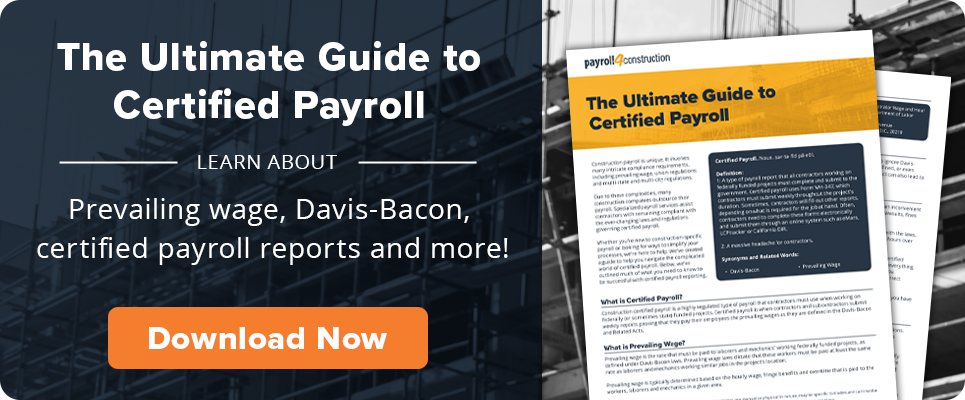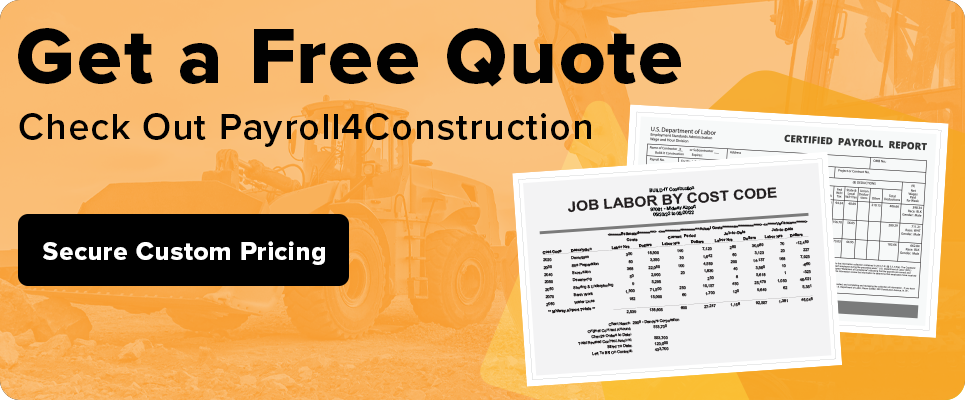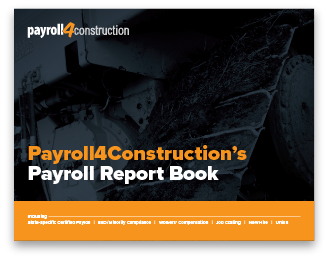
April 15, 2024
When you’ve got multiple workers on multiple jobsites with multiple wages and multiple pay rates, maintaining accurate payroll can get extremely confusing. Multi-state payroll in particular brings about a variety of time-consuming regulations that require absolute accuracy.
According to Independent Electrical Contractors, more than 5,000 cities across 17 states have their own state-specific regulations and city-specific tax rules that construction employers are required to follow.[1] When managing interstate payroll operations, these or contractors could face numerous fines, potential lawsuits and compliance violations.
While multi-state payroll is undoubtedly challenging, it unlocks wider project opportunities, attracts skilled workers, and can help streamline processes. But there are some ways to ensure you’re handling it correctly. Let’s break down the best ways to tackle a beast like cross-state payroll administration.
Key Takeaways:
- Multi-state payroll requires a comprehensive understanding of the intricacies of each state’s regulations to to ensure legal compliance.
- Multi-state payroll processing requires compliance with differing state regulations like taxes, unemployment insurance and deductions.
- Ways to streamline interstate payroll management involve using advanced construction payroll software, integrating payroll, employee self-service portals, training staff, establishing policies and conducting audits.
- Outsourcing payroll can help alleviate the burden of managing diverse state regulations and tax laws.
What is Multi-State Payroll?
Multi-state construction payroll involves managing and paying employees who work in different states for different projects. This entails:
- Diverse state tax rules
- Tracking work hours per state
- Applying varied pay rates
- Varying minimum wage laws
- Overtime rules
all while avoiding costly penalties and ensuring government compliance.
Effectively handling cross-state payroll operations involves accurate calculations of state income tax withholding, registration with state tax agencies, adherence to state unemployment insurance requirements and accurate payroll record-keeping.
The multi-jurisdictional payroll landscape requires a comprehensive understanding of the intricacies of each state’s regulations to ensure legal compliance, avoid financial penalties and maintain operational efficiency.
What are Multi-State Payroll Requirements?
When looking at multi-state payroll processing requirements, you need to navigate paying remote employees who crisscross state lines, which means juggling multiple tax forms with varying rates. Interstate payroll administration requires compliance with differing state regulations like payroll tax requirements, unemployment insurance and deductions. Each state comes with its myriad of diverse labor and tax landscapes, but they are important to properly manage cross-state employee compensation.. Some considerations include:
- Businesses must comprehend and adhere to the distinct labor laws, like federal minimum wage rates and overtime regulations, in each state where they operate and stay up to date on any employment-related statutes that impact payroll calculations.
- Companies have to register with state tax agencies is essential to ensure compliance with state income taxes and unemployment insurance. But each jurisdiction is specific regarding State Unemployment Insurance (SUI) requirements. Construction businesses must also be aware of any local taxes or additional payroll obligations imposed by specific states or localities.
- Employee residency also plays a vital role, as some states’ tax income is based on the employee’s residence, while others base it on the location where the work is performed. This distinction requires careful tracking of employees’ work locations and accurate determination of tax obligations.
To guarantee you’re keeping up with the requirements for multi-jurisdictional payroll management, stay up to date and continuously research compliance regulations.
How Can Contractors Simplify the Multi-State Payroll Process?
When managing cross-state payroll operations, there are a few methods that can not only help save time, but also maintain accuracy, compliance and efficiency. Here are key strategies to streamline this complex process:
Use Advanced Payroll Software For Multi-State Payroll Processing
Invest in payroll software specifically designed to handle interstate payroll operations. These systems often come equipped with features such as automated:
- tax calculations
- compliance checks
- reporting functionalities
Advanced software can help automate processes, significantly reducing manual efforts and minimizing the risk of errors.
Payroll software also involves automated systems equipped with real-time updates on compliance changes in different states. Staying proactive about regulatory changes ensures that your employee multi-jurisdictional payroll processes remain compliant and avoids the risk of penalties.
Integrate Payroll
Consider a payroll solution that seamlessly integrates with accounting and time tracking software. Integrations facilitate a cohesive and automated flow of data, ensuring accuracy in cross-state payroll calculations. By linking payroll with accounting systems, financial transactions are streamlined, reducing the risk of errors and enhancing financial reporting. Time tracking integration allows for precise recording of hours worked in different states, aiding in compliance with varied labor laws. This also reduces manual entry and provides real-time data insights to help navigate multi-state payroll processing with ease.
Employee Self-Service Portals
Implement employee self-service portals that allow workers to access and manage their payroll information. This not only increases autonomy for employees but also reduces administrative workload. Self-service portals enable employees to update personal details, view pay stubs and access relevant tax information independently.
Outsource Payroll Services
Consider outsourcing payroll to a construction-specific payroll service. These services will often have features that can handle union fringe and deduction tracking, certified payroll calculations and an in-house support team with expertise in interstate payroll administration. Outsourcing can help alleviate the burden of managing diverse state regulations and payroll tax laws, allowing your construction business to focus on core operations while ensuring compliance.
Provide Regular Training for Payroll Staff
Keep your payroll team well-informed about multi-jurisdictional payroll regulations through regular training sessions. Ensuring that your team is up to date on changes in labor laws, tax requirements and compliance updates will contribute to accurate cross-state payroll processing.
Establish Clear Policies and Procedures
Develop clear and comprehensive policies and procedures for multi-state payroll processing operations. This helps provide a standardized framework for payroll operations across diverse jurisdictions. Ensuring that your guidelines for interstate employee compensation are clear can help ensure consistency in payroll calculations, tax withholdings and compliance processes. This will minimize the risk of errors and discrepancies as well as help payroll professionals navigate state labor laws and tax regulations. It can also help train staff by creating a shared understanding of the procedures essential for cross-state payroll compliance.
Regular Audits and Reviews
Conduct regular audits and reviews of your multi-jurisdictional payroll processes. This helps identify any discrepancies, errors or areas for improvement. Regular assessments contribute to the continuous refinement and optimization of your interstate payroll operations. Be sure to maintain detailed records of employee work locations, hours worked in each state and other relevant information. These records serve as crucial documentation during audits or legal inquiries.
When conducting an audit, look for ways to verify that your processes are improving. For example, are your certified payroll reports being approved by collecting agencies on time? Has it been easier to pay your multi-state employees and easier to gather labor hours? If you’re noticing issues in these areas, consider other methods for cross-state payroll administration.
How Can Payroll4Construction Help Handle Multi-State Payroll?
Multi-state payroll processing may be different per job, so every contractor will need to find a system that works best for them. There may be no universal answer for streamlining the process, but you can limit the stress of reporting by understanding the various interstate payroll management requirements and finding strategic ways to simplify the process. Or, by going a step further and investing in a construction-specific payroll system that will do it for you.
Specialized payroll services, like Payroll4Construction, can handle the complexities that come with cross-state employee compensation. We understand the nuances of multi-jurisdictional payroll, stay updated on changes in governmental regulations, maintain accurate employee records and prioritize clear communication with employees.
[1] Meibers, J. (2023, November 20). The Complete Guide to Construction Payroll. IEC Insights. https://insights.ieci.org/the-complete-guide-to-construction-payroll/
Share Article
Keep on current news in the construction industry. Subscribe to free eNews!



